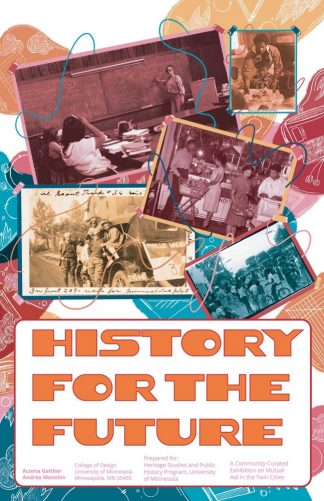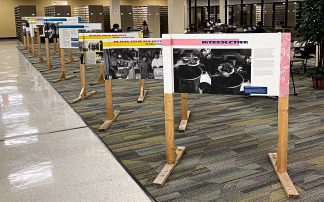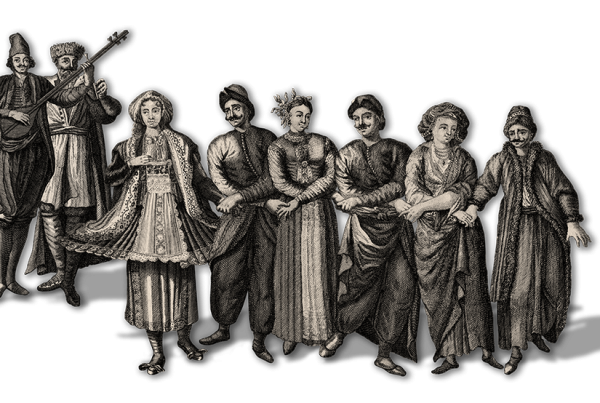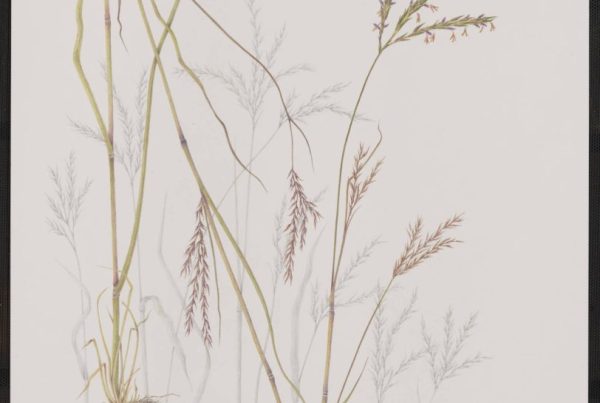“History for the Future” frames mutual aid as a response to the ongoing crises of dispossession, slavery, and racial capitalism.
“History for the Future” frames mutual aid as a response to the ongoing crises of dispossession, slavery, and racial capitalism. This ongoing series of free public programs and temporary exhibitions which bring local histories of radical community care in conversation with the practices and goals of mutual aid organizing today. “History for the Future” is on display in the basement of Wilson Library through May 11, 2022.
The exhibition panels represent a small sample of over nine months worth of archival research on “mutual aid,” “survival,” and “community care,” in Twin Cities history. Aiming to include an intergenerational audience of all those interested in the histories of mutual aid, the language used in the text intends to open questions, begin conversations, and share just a small but exciting sample of the countless histories of mutual aid in our communities.
The exhibition website, www.HistoryForTheFuture.org, will soon house complete research notes and the project archive.
Exhibit details
What: History for the Future
When: Jan. 18 through May 11, 2022
Where: Wilson Library, basement
Hours: Open during regular building hours at Wilson Library
Exhibition acknowledgements
 “History for the Future” is a site-specific and community-led public history initiative that takes place on stolen Dakota lands. As public historians we are committed to transforming the field we are trained in, positioning our practices of history within the ongoing movements in resistance to the logics of dispossession and racial capitalism. In all of our visioning and planning processes from the past year, we have strived to nurture community, to share resources, and to transform the institutions we work from in order to build radical futures of collective liberation.
“History for the Future” is a site-specific and community-led public history initiative that takes place on stolen Dakota lands. As public historians we are committed to transforming the field we are trained in, positioning our practices of history within the ongoing movements in resistance to the logics of dispossession and racial capitalism. In all of our visioning and planning processes from the past year, we have strived to nurture community, to share resources, and to transform the institutions we work from in order to build radical futures of collective liberation.
“History for the Future” is shaped by invaluable insight and consultation from our peers and mentors at the University of Minnesota. The individuals who this project is indebted to include Kevin Murphy, Tracey Deutsch, Jigna Desai, Kari Smalkoski, Juliet Burba, Andre Deckrow, Esteban Perez-Cortez, Kylie Hoang, Jacob Noble, Denise Pike, Srija Chatterjea-Sen, Clarke Sanders, Sophie Hunt, Peter Rachleff, Jamie Schwesnedl, Richard Anderson, Liz Sevcenko, Amber Delgado, Treasure Tinsley, and Mohamud Mohamed.
Our exhibition and programming is supported by: The Heritage Studies and Public History program the University of Minnesota; Minnesota Transform, a Mellon Foundation Higher Education Initiative; Thinking Food: Radically Reimagining Food Studies in the Twin Cities; and Climates of Inequality, a project of the Humanities Action Lab.
Co-creative director biographies
Acoma Gaither (she/her) is a graduate of the Heritage Studies and Public History program at the University of Minnesota. In 2018 she completed her B.S. in Youth Studies focusing her work on how museums can better serve youth of color and the surrounding community. She’s been involved with several projects at the Minnesota Historical Society including History of Race and Policing in Minnesota, Historic Fort Snelling, and Restorative Justice. This past spring she was a Protest and Preservation Collections Care fellow with the Midwest Art Conservation Center and the George Floyd Global Memorial. Acoma’s academic interests include Black Cultural Studies, Digital Humanities, Youth Development, and Curatorial Studies. As a curator and public historian of color, she hopes to challenge institutional norms that stifle community representation.
Andrea Manolov (she/her) is exploring radical modes of writing histories and visioning futures. Committed to public history work grounded in the needs of collective anti-imperial futures, Andrea brings together her energy as a supporter, organizer, and innovator with skills in research, exhibition ideation, and arts programming. Her public history work includes the Interstate Digital Archive at Mixed Blood Theatre, a place-based archive of queer and trans Asian American space-making, and event coordination for Climates of Inequality, a project of the Humanities Action Lab. She is a graduate of the Heritage Studies and Public History program at the University of Minnesota.
Background Statement
“History for the Future” emerged from efforts to situate present day mutual aid organizing in the Twin Cities into longer histories of community care, political activism, and the ongoing work of building radical futures. This idea to initiate a public history project on local histories of mutual aid emerged during our personal engagements with the abundance of community organizing during the summer of 2020, and over the following year.
During the uprisings in the wake of the murder of George Floyd and in the midst of escalating economic impacts of COVID-19 a blossoming of mutual aid practices, networks, and visions grew across the Twin Cities to meet immediate housing, food, and healthcare needs. From June through August of 2020, students and faculty of the University of Minnesota’s Heritage Studies and Public History program partnered with the Minnesota Youth Story Squad and received training from local media organizations to document community responses to crisis.





